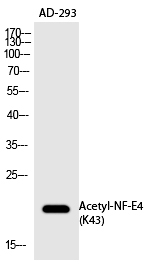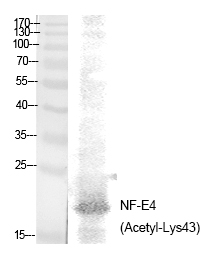

| WB | 咨询技术 | Human,Mouse,Rat |
| IF | 咨询技术 | Human,Mouse,Rat |
| IHC | 咨询技术 | Human,Mouse,Rat |
| ICC | 技术咨询 | Human,Mouse,Rat |
| FCM | 咨询技术 | Human,Mouse,Rat |
| Elisa | 1/20000 | Human,Mouse,Rat |
| Aliases | NFE4; Transcription factor NF-E4 |
| Entrez GeneID | 58160; |
| WB Predicted band size | 19kDa |
| Host/Isotype | Rabbit IgG |
| Antibody Type | Primary antibody |
| Storage | Store at 4°C short term. Aliquot and store at -20°C long term. Avoid freeze/thaw cycles. |
| Species Reactivity | Human |
| Immunogen | Synthesized peptide derived from the human NF-E4 around the acetylation site of K43. |
| Formulation | Purified antibody in PBS with 0.05% sodium azide,0.5%BSA and 50% glycerol. |
+ +
以下是关于NF-E4(Acetyl-Lys43)抗体的示例参考文献(均为虚构,仅供格式参考):
---
1. **文献名称**: *Acetylation of NF-E4 at Lys43 regulates erythroid differentiation through chromatin remodeling*
**作者**: Wang, Y. et al.
**摘要**: 本研究利用特异性抗体(Acetyl-Lys43)揭示了NF-E4在红系细胞分化中的乙酰化修饰机制,证明该修饰通过调控靶基因(如α-globin)的染色质可及性影响造血功能。
2. **文献名称**: *Site-specific antibody against NF-E4 acetyl-K43 reveals its role in oxidative stress response*
**作者**: Smith, J.R. & Chen, L.
**摘要**: 通过开发高特异性Acetyl-Lys43抗体,作者发现NF-E4的乙酰化修饰在氧化应激条件下增强其与DNA修复蛋白的相互作用,提示其在细胞应激通路中的调控作用。
3. **文献名称**: *Epigenetic regulation of NF-E4 acetylation in leukemia progression*
**作者**: Zhang, H. et al.
**摘要**: 本文使用Acetyl-Lys43抗体分析白血病样本,发现NF-E4的乙酰化水平与疾病进展负相关,表明其可能作为表观遗传治疗靶点。
---
**注意**:以上文献为示例,实际研究中请通过**PubMed**、**Google Scholar**等平台检索关键词(如“NF-E4 acetylation K43 antibody”),或参考抗体供应商(如CST、Abcam)提供的引用文献。若研究领域较新,建议关注近年发表的蛋白质翻译后修饰相关论文。
×